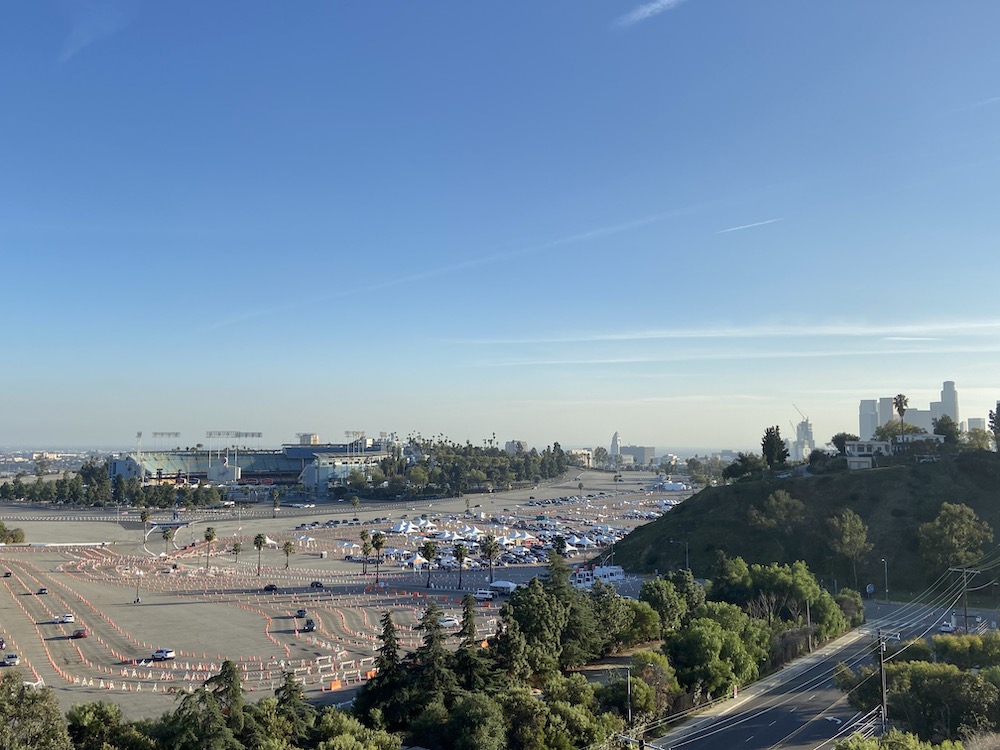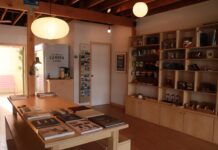Leer en español
Ceci Dominguez had been on the Los Angeles County website for most of the morning trying to sign up for a COVID-19 vaccination appointment. She called the offices of two local council members, Mitch O’Farrell and Gil Cedillo, as well as a friend, and together they were piecing together how to navigate the portal. All of the appointments, however, were booked.
Then, at 4:45 p.m. Jan. 19, Dominguez found an open slot. It was at 4:50 p.m. that same day.
“I left my back door open, I left my dogs in the house,” Dominguez said, “and proceeded to drive to Dodger Stadium.”
Arriving at one of the country’s largest vaccination sites, just three minutes away from her home in Elysian Valley, Dominguez became one of more than 1,585,985 Angelenos as of Feb. 17 to receive their first vaccine dose against COVID-19 — around 16 percent of the county’s population.*
Emerging as the new epicenter of the national COVID-19 pandemic in late December, LA has just begun observing decreasing case rates after hitting its case peak on Jan. 13 — but not before one in every three county residents contracted the virus, according to the county health department’s own estimates.
The pandemic has gone especially unchecked in underserved, predominantly non-white neighborhoods. Data from The New York Times suggests that one in nine residents of Mt. Washington and Highland Park, which are 79 percent and 82 percent non-white respectively, have had COVID-19. The case rate in Santa Monica, which is two-thirds white, is just one in 24.
Yet early data suggests that nationally and in Los Angeles — a city where transportation and healthcare infrastructure remain disproportionately inaccessible to minority communities — Black and Latinx residents are being vaccinated at disproportionately lower rates than white residents. Legacies of medical abuse, such as forced sterilization campaigns against Latina mothers in 1970s Los Angeles, are also likely to make non-white residents more hesitant to get vaccinated.
According to Ilan Shapiro, a bilingual physician and Medical Director for Health Education and Wellness at AltaMed, the key to building back this trust lies in evidence-based messaging: using media and trusted community members to spread news of the vaccine’s benefits in layman’s terms.
“One of the things we need to be doing is making sure we are vaccinating our communities against fear with a dose of truth,” Shapiro said.
Shapiro has spoken with anchors on Univisión and Noticias62 and uses his social media to share information about the latest COVID-19 developments. He has also teamed up with the Mexican Consulate of Los Angeles to do outreach — all residents, regardless of citizenship status, are eligible to be vaccinated, but many undocumented residents fear deportation if they make themselves too visible.
Shapiro said the COVID-19 vaccine’s quick development resulted from technology and research first discovered when combatting SARS and MERS in the early 2000s, and added that the mild side effect profile should not cause concern.
He emphasized the importance of networks of bilingual messengers known as promotoras — community members who receive basic health education training — and the use of pre-existing voting and census outreach infrastructure to speed up vaccine registration.
“We need to be present throughout the entire process,” Shapiro said.
Dominguez, who is a second-generation Mexican American, said she has spoken with friends and family members who are hesitant about getting the vaccine. After dropping from a preferred provider insurance plan to a health maintenance insurance plan in 2012, Dominguez said she has often been unimpressed with the quality of facilities she has visited and does not blame community members for wanting to limit their interactions with healthcare providers.
“It runs through our minds because history has told us that these things [malpractice] have happened,” Dominguez said.
Technological challenges and the enormous demand have also left many seniors with stories like Dominguez’s, struggling for hours to navigate complex registration websites. Margaret Irwin, elder director for Eagle Rock Neighborhood Council (ERNC), said she has begun working with the developers of the community service app Mon Ami to match NELA seniors with volunteers who can help them register for a vaccination appointment or drive them to vaccination sites.

“I’m hoping, if nothing else, this will make a senior feel better that we’re on their side and we want to get them vaccinated,” Irwin said. “I really treasure every single senior. And if they’re having trouble getting a vaccination, we have many abled, compassionate people in Eagle Rock who are right now willing to help.”
Seniors who call a hotline number — 323-435-3850 — will be able to leave a voicemail with their name, number and the nature of their request, according to Irwin, who said she knows of at least five to 10 volunteers who have committed. Based on that information, Irwin said she will then connect each senior with a volunteer through the Mon Ami app.
Irwin also said that the ERNC has been discussing other ideas to facilitate vaccine distribution in NELA, including pop-up tents or delivery to senior homes, should the supply become available. LA County has administered nearly all of its vaccine supply, forcing some distribution sites, including Dodger Stadium, to administer only second doses.*
“We have to be patient,” Irwin said.
Social media has also served as a powerful tool during the vaccine rollout. Vaccine-related posts in forums like the Eagle Rock Neighborhood Group have garnered more than 100 likes, with commenters describing wait times between 20 minutes and two hours. Upon receiving her vaccination, and knowing the hesitancy of many community members, Dominguez decided she would speak about her experience by posting a video to Facebook.
“I sent it to all my seniors, I sent it to almost everyone in my phone,” Dominguez said.
Dominguez’s video was amplified by the East Area Progressive Democrats (EAPD) club, for which Dominguez serves as membership chair. President of the EAPD Hans Johnson said the group has been involved in combating misinformation and promoting community involvement since the beginning of the pandemic. Evidence-based information spreads most effectively when carried by a trusted community member like Dominguez, he said.
“The club’s information [is] tailored to that mode of delivery,” Johnson added. “Some people [are] comfortable doing it in neighborhoods that they know and in their own buildings or multifamily dwellings next to them or near them.”
The centering of vaccine distribution at large centers like Dodger Stadium, accessible only by private vehicle, also presents complications. Johnson said the EAPD has been pushing local government to diversify distribution methods, recognizing that many over the age of 65 — the only age group currently eligible for vaccination — may struggle to drive or wait in lines for extended periods. Programs like Irwin’s elder hotline may help address some of these problems.
“The chief concern we’re facing is not necessarily about accessing this vaccine,” Johnson said. “It’s about the mode of delivery of this vaccine and the scarcity of vaccines at this point, [which is] curbing the county’s ability or the city’s ability to supplement the drive-up delivery with mobile in-home vaccinations.”
Jessica Dirkes, professor and public health program coordinator at Occidental College, also said she found the current method of distribution counterintuitive.
“I think that these big huge centers [are] a very odd approach,” Dirkes said. “There should be more of a focus on finding community clinics that are more accessible to people.”
Dirkes added that she thinks the vaccine rollout will gain steam as more people get vaccinated and learn of others who have been vaccinated. Most people know someone who has had COVID-19, a fact which might persuade those who have resisted vaccinations in the past.
“I do believe the system will catch up with itself,” Dirkes said.
For the time being, seniors in NELA like Dominguez are looking forward to their next shot and telling all who will listen about their experience.
“I showed a picture of myself [on Facebook] with my band-aid,” Dominguez said. “And I said, ‘I’m fine.’ ‘I can’t wait for my second dose,’ I said. I just cannot wait.”
NELA seniors who need help registering for a vaccination appointment can leave a voicemail at 323-435-3850 or email Margaret Irwin at margaret.irwin@eaglerockcouncil.org.
For COVID-19 updates in both English and Spanish, follow Ilan Shapiro at https://drshaps.com/ or on Twitter @Dr_Shaps.
If you fall within California’s eligibility criterion, you can book a vaccine appointment through the LA City Hotline at 2-1-1 or 833-540-0473, or through the CA.gov hotline at 833-422-4255.
Correction (3:55 PM, Feb.10) — Ilan Shapiro is a bilingual physician and Medical Director for Health Education and Wellness at AltaMed, not AltaCare.
* This article was updated Feb. 17 to reflect the more recent statistics included in this article’s Spanish translation.
![]()
































